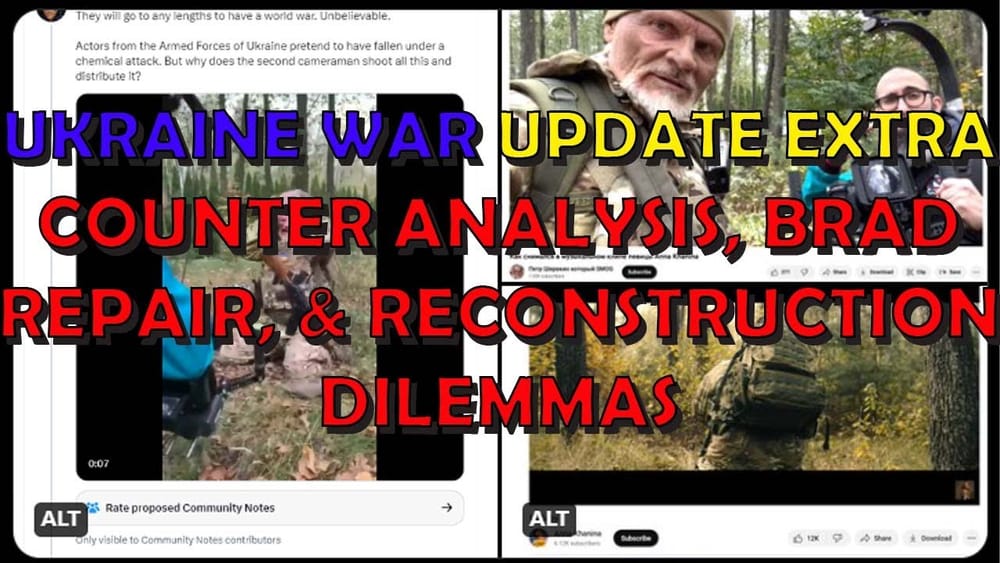Ukraine War Upd. EXTRA: Counter Analysis, Bradley Repair, & Reconstruction Dilemmas
Table of Contents 📖
| Topic ID | Topic Title | Timestamp |
|---|
"There is a genuine argument to be had here, because if you are Ukrainian and you are fighting for your homeland, and your homeland is wrecked, right, and you don't make any effort to kind of make it something to feel proud of, and to be able to live well in, then what are you fighting for?"
Hello Team!
Jonathan advises listening to him at 1.25-1.5x speed as he speaks slowly. He listens to other podcasts at 1.8x speed. Listening at a faster speed makes the content nicer in his opinion as there are fewer pauses and filler words.
Return to top⤴️
Challenges with Bradley Fighting Vehicles
According to the Ukraine Latest podcast from The Daily Telegraph, the Ukrainians are having trouble fixing the Bradley infantry fighting vehicles provided by the US. While not many have been completely destroyed, a significant number are in need of repair. However, the Ukrainians are struggling to fix them adequately due to a lack of maintenance ability. This presents another challenge for Ukraine in their counteroffensive.
Return to top⤴️
Analysis of Ukraine's Early Counteroffensive
The War on the Rocks podcast with Michael Kofman and Rob Lee provides an analysis of Ukraine's early counteroffensive in June:
- The initial attacks were a real counteroffensive attempt, not just probing attacks, but ultimately were not successful. Ukraine used a lot of its new modern NATO-trained brigades.
- Russia has adapted its tactics, using fluid battle approaches, counterattacking after losing trenches rather than just defending static lines. This gives Ukraine a lot to think about.
- Russian mine tactics have evolved, such as stacking multiple anti-tank mines to destroy mine-clearing vehicles. Minefields are a huge challenge.
- The new Ukrainian brigades' performance has not lived up to expectations, likely due to being formed on short notice.
- Examples were given of Ukrainian units getting disoriented at night and not following mine-cleared lanes, delaying advances.
- The offensive was prosecuted by brigades but in practice was a series of reinforced companies, which may be why it was mistaken for probing attacks.
Key takeaways:
- The hugely important role of mines and how they expose Ukraine to Russian fire
- The importance of tactics, training and experience
- The basic challenge of maneuvering across well-defended terrain is not new, even if amplified by modern technology
Russian Travel Restrictions on UK Diplomats
Russia has imposed tight travel restrictions on British diplomats, requiring them to provide 5 days notice and extensive details to leave a 120km free movement zone. Only the ambassador and 3 senior diplomats are exempt. This is one of many irregular ways authoritarian states make life difficult for diplomats. Examples were given of diplomats finding threatening messages left in their homes and a diplomat's cat being frozen to death, suspected as deliberate. The UK Foreign Office disputed Russia's claim that a senior British diplomat had been summoned, calling it disinformation. Jonathan believes Russian diplomats in Europe, who are basically spies, should be similarly restricted as much as possible.
Return to top⤴️
Viral Disinformation Tweet
A viral tweet by a Twitter Blue subscribed account falsely claimed a video showed a Ukrainian soldier and cameraman staging a chemical attack. In reality, the clip was from the set of a music video by Ukrainian singer Anna Khanina about the war. Jonathan notes that such disinformation spreads rapidly online and is very difficult to correct after the fact. People will believe it and it's too late to do anything about it.
Return to top⤴️
Debate over Wartime Reconstruction Spending
There has been pushback in Ukraine about spending on city beautification projects during wartime. President Zelensky stated that paving, fountains, etc. should wait until after victory and that state resources should go to defence first. The Minister of Culture resigned over this, claiming a "wave of misunderstanding about the importance of culture in wartime." Jonathan sees valid arguments on both sides:
- If fighting for a homeland that is wrecked, people need something to feel proud of and able to live well in, otherwise what are they fighting for?
- However, with finite resources, there is a question of how much to spend on rebuilding vs. the war effort. Not everywhere in Ukraine is a warzone, so some degree of normal spending is needed.
- There is no objective dividing line on how much is appropriate to spend. It requires subjective agreement.
Ultimately, if Ukraine doesn't win the war then the reconstruction debate is moot. But people still need to live in the meantime. Jonathan is interested to hear others' thoughts on this challenging issue.
Return to top⤴️
Zelensky's Vision for Crimea
President Zelensky has an idea to build a "Silicon Valley" type project in Crimea after the war, with a super technological university and companies operating year-round. Jonathan sees this as a great opportunity for Ukraine to strategically start again, playing to its strengths in IT to gain a competitive advantage and attract foreign investment. He compares it to the US potentially becoming a leader in green energy technology to future-proof its global position. While some frame such moves as progressive or liberal, Jonathan argues it is actually a clever business and economic strategy to be a major player in future industries. In the US, lobbying by fossil fuel industries hindered such a transition, which Jonathan sees as a missed opportunity. He believes Ukraine is smart to position itself for the technological future in this way, as so much of life now takes place online. It's a sensible economic move for the country.
Return to top⤴️
Wrap up
Jonathan has to go do some "real life things" now. He thanks the viewers for watching and for their support, saying it is so important. He will be back again tomorrow.
Return to top⤴️



